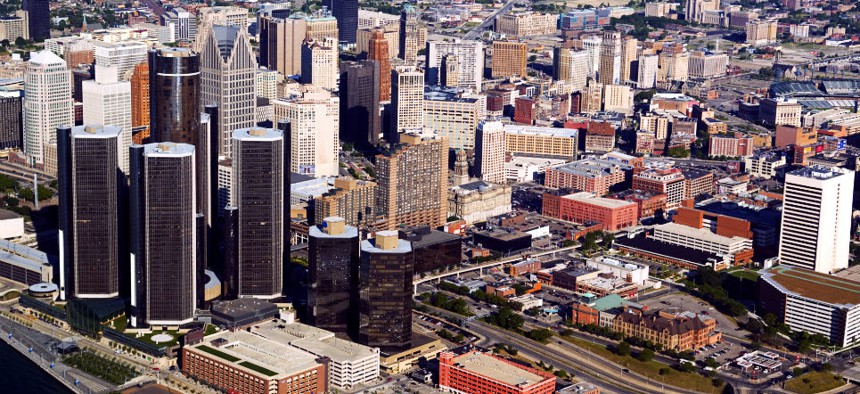Detroit and the Evaporating Right to Running Water

Darren Brode/Shutterstock.com file photo
A UN special rapporteur's statement on water shutoffs in the beleaguered city raises questions about what the social contract means for some Americans.
Detroit: It's a metaphor for the decline of American manufacturing, the object ofthe ruin-porn gaze, and fodder for triumphalist ads.
It also raises some serious questions about what living in a civilized democracy means.
Take the case of water service for residents of the city. Detroit is undergoing serious austerity measures in an effort to right its finances and emerge from bankruptcy. It has slashed services, reduced pensions, and considered selling off the Detroit Institute of Art's collection. And it has at times cut off water services to residents more than two months delinquent on their bills.
There's an obvious logic to this: If you don't pay your bills, you don't get services, and the city can hardly afford to forgo a single dollar given its fiscal problems. Yet there are good reasons why residents might fail to pay for even this most basic of needs. Unemployment rates inside the city hover at nearly 25 percent. From 2008 to 2012, more than 38 percent of residents lived below the poverty level. Meanwhile, the bills are growing, as the city has jacked water rates up by 8.7 percent in an attempt to compensate for crumbling infrastructure.
On Monday, the UN Special Rapporteur on the human right to safe drinking water and sanitation issued a scathing statement against the shutoffs:
Without water, people cannot live a life with dignity—they have no water for drinking, cooking, bathing, flushing toilets and keeping their clothes and houses clean. Despite the fact that water is essential for survival, the city has no data on how many people have been and are living without tap water, let alone information on age, disabilities, chronic illness, race or income level of the affected population.
Denial of access to sufficient quantity of water threatens the rights to adequate housing, life, health, adequate food, integrity of the family. It exacerbates inequalities, stigmatizes people and renders the most vulnerable even more helpless. Lack of access to water and hygiene is also a real threat to public health as certain diseases could widely spread.
In addition, the report says many shutoffs are in error, but there's no good way to dispute them. It sounds like the U.S. media's worst caricatures of the developing world. Yet residents also told the UN they were worried child-protective services would take their children. Which seems like a cruel irony: The government is present enough to take your kids, but not to help you get water.
In an aggrieved response, the city of Detroit disputed the rapporteur's statement. The city chief of staff said officials met with the UN, but "it became clear shortly into the meeting that the UN representatives had reached their conclusions and prepared their recommendations before the meeting even began." In August, the city issued a plan for addressing these issues, including payment plans and a moratorium on shutoffs.
That's good news. And it's easy to dismiss this as preposterous meddling by the United Nations. Doesn't it have bigger issues to worry about?
Of course it does. But the sad situation in Detroit also raises serious questions about what a citizen of a developed country—a country that not only believes itself to be the ideal model for liberal democracies around the world, but also regularly exports its way of life via commerce, capital, and sometimes military might—can expect of its government. Is a social contract still a social contract when the demands of austerity can cancel its provisions?
For the last few years, income inequality has been one of the more important debates on the national and international stage. Detroit is a particularly extreme example, because while Detroiters can't scrounge the money to pay their water bills, next-door Oakland County is extremely well-off. There's also a question of democracy. As Chris Lewis reported here last year, many Michigan cities—including Detroit—currently have state-appointed emergency managers. For practical purposes, that means that residents of those cities, who are overwhelmingly black, are without democratic representation, governed by bureaucrats they didn't select, who aren't accountable to them:
A group of politicians, unions, activists, and residents from affected districts argue that PA 436 violates their constitutional right to equal protection.
The suit highlights the paradox of American municipal governance. Local government is deeply ingrained in the ethos of American democracy, from colonial-era New England town hall meetings to New York City's experimentwith people-powered budgeting. But it is not an inalienable right. The U.S. Constitution guarantees all states a "republican government," but gives states power to grant—or not grant—home rule to municipalities.
In many ways, Detroit seems to be stepping back from that ledge. Last month, recently elected Mayor Mike Duggan reached a deal with the city's emergency manager to turn control back over to elected officials. The water plan shows responsiveness to residents' needs. The deeper causes of the bankruptcy, and of water-bill delinquency, however, aren't going anywhere—nor are the questions of what American citizens can and should expect from their governments.
(Image via Darren Brode/Shutterstock.com)





